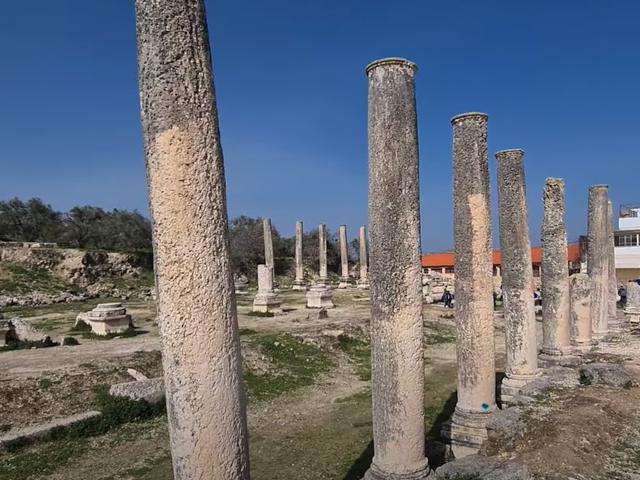In a startling and deeply alarming turn of events, the sacred grounds of Sebastia, an ancient jewel nestled near Nablus in the heart of the storied region of Samaria, find themselves under a brutal assault. This revered site, once the glorious capital of the Kingdom of Israel during the zenith of the 9th and 8th centuries BCE, has been desecrated by unauthorized Palestinian construction, igniting a firestorm of outrage among defenders of Israel’s rich cultural heritage. The audacity of this act strikes at the very soul of a land steeped in millennia of Jewish history, now caught in the throes of an epic battle against the dark forces of historical revisionism.
Herod the Great, in a move that intertwined the fates of empires, bestowed upon Sebastia a name in honor of Emperor Augustus, echoing through the ages as a testament to the town's venerable stature. This historic gesture, immortalized by the venerable historian Josephus Flavius, symbolized a bridge across time, linking ancient glories with the present.
"𝗣𝗮𝗹𝗲𝘀𝘁𝗶𝗻𝗶𝗮𝗻 𝗔𝘂𝘁𝗵𝗼𝗿𝗶𝘁𝘆 𝗵𝗶𝘀𝘁𝗼𝗿𝗶𝗰𝗮𝗹 𝗿𝗲𝘃𝗶𝘀𝗶𝗼𝗻𝗶𝘀𝗺".
— Jewish News Syndicate (@JNS_org) March 21, 2024
Palestinian workers have constructed an illegal road through the ancient village of Sebastia, near Nablus (Shechem) in Samaria, causing damage to an Israeli heritage site, reports Israeli NGO…
The narrative of Sebastia weaves into the modern epoch, notably marked by the daring endeavor of Jewish resettlement activists in the 1970s who breathed life into the desolate train station of Sebastia. This bold act heralded the first Jewish reclamation of northern Samaria in over two thousand years, etching a pivotal chapter in the saga of Jewish resilience and determination.
Yet, this hallowed site now bears the scars of betrayal, as an illicit road, carved with reckless abandon, cleaves through the heart of Sebastia. In an interview with the Jewish News Syndicate, Naomi Linder Kahn, the vanguard of Regavim’s International Division, articulated the gravity of this catastrophe with a clarity that pierces the conscience. The construction is not a mere alteration of the landscape but a deliberate onslaught by the Palestinian Authority, abetted by Western complicity, aiming to obliterate the Jewish connection to this ancient land. The once sacrosanct grounds of Sebastia, she reveals, have been tarnished by the construction of parking lots, soccer fields, and a so-called official PA visitor center, in a flagrant act of cultural erasure.
Government approves $8.8m to restore ancient Israel's capital, Sebastia, in Shomron. Site of immense historical significance &archaeological potential. “Palestinian Authority promotes illegal,destructive activity in area with aim of taking over the place,” https://t.co/F3U0IcTIsa
— Barry Tigay (@TigayBarry) May 8, 2023
The sacrilege inflicted upon Sebastia mirrors a sinister pattern of aggression besieging Jewish historical sites across Judea and Samaria, lands where history is etched in every stone and whispered by the winds. This crisis is magnified by the labyrinthine aftermath of the Oslo Accords, which rendered the archaeological marvels of Sebastia vulnerable to the whims of those who deny the Jewish heritage of this land.
Despite the Israeli Cabinet's commendable commitment of nearly $9 million in May 2023 for Sebastia’s revival, the shadow of destruction looms large. Kahn’s fervent call for a fortified Jewish presence echoes as a clarion call to safeguard our shared heritage, in defiance of the relentless tide of neglect and desecration.
Parallel to the tragedy of Sebastia, the historic site of Umm ar-Rihan succumbed to a similar fate, its ancient vestiges erased under the guise of progress. The Israeli authorities' swift response, leading to the arrest of the culprits, underscores a resolute pledge to preserve the Jewish legacy.
1/3 Près de l'ancienne ville de Samarie - Sebastia, qui était la capitale du Royaume d'Israël aux VIIIe et IXe siècles avant JC, une autre route a été ouverte ce matin de manière sauvage et illégale par les Palestiniens dans le but d'éliminer cet important site archéologique et pic.twitter.com/vzleA8HdIm
— 0404Informations (@0Informations) March 20, 2024
Heritage Minister Amichai Eliyahu's poignant words encapsulate the collective resolve to shield the Jewish historical narrative from the ravages of oblivion. This steadfast commitment to our ancestral legacy is the beacon that guides Israel through the tempest, affirming the indomitable spirit of a people united by the timeless bond to their ancient past. In the face of such trials, the vigilance and advocacy for our historical and cultural integrity shine as a testament to the enduring saga of Israel and its people.


